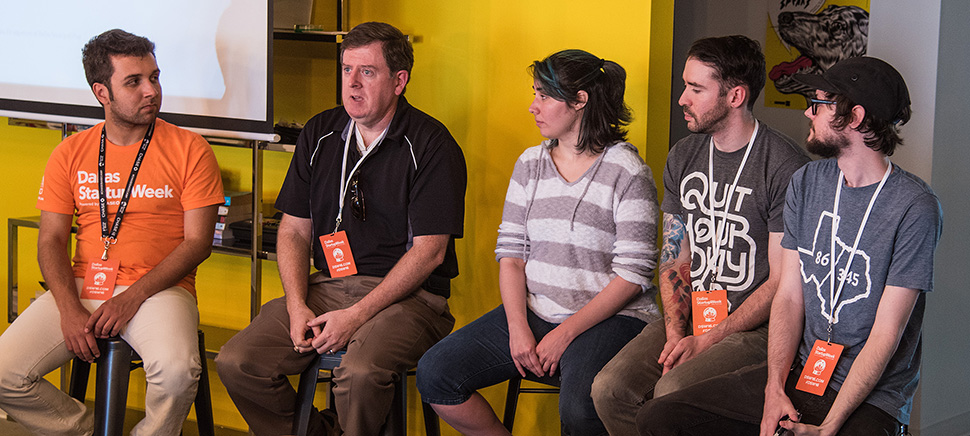The video game industry looks fun and exciting, but breaking into this field is anything but glamorous.
A panel of video game veterans swapped war stories and offered advice about how to freelance, start your own game, or get noticed by one of the bigger companies. The panel was held Thursday afternoon at Kowork in downtown as part of a Dallas Startup Week session on gaming.
Like any industry, networking is the best way to get noticed, find jobs, and connect with others with the same interest.
“You are going to have to sacrifice, especially if you’re an indie [independent] developer.” – Rebeca Easton
“You are going to have to sacrifice, especially if you’re an indie [independent] developer,” said Rebeca Easton, an author and freelance narrative designer. “The time you spend with friends—I’ve lost friends because I disappear for a long time. If it’s truly what you want do, you’ve got to be willing to make those sacrifices.”
She said connecting with the local chapter of the International Game Developers Association is a good way to start.
“Go in there with the mindset of creating long-term friendships,” Easton said.
In other words, don’t just immediately go into pitch mode.
GAME INDUSTRY IS TOUGH TO BREAK INTO
Regardless, it’s a tough industry to break into, with many of the panelists saying they started out working for free or barely any money just to build a portfolio. They often have to work other jobs and do this on the side.
“The gaming industry is full of special forces and SWAT teams. All the grunts get washed out pretty quick,” said Kevin O’Gorman, a video game designer and instructor at The Art Institute of Dallas.
He said just because you have a new idea that sounds amazing to you, the big companies may not be so interested.
“The game industry is small but incredibly risk adverse,” O’Gorman said.
He said there’s a reason a new “Call of Duty” or “Madden NFL” comes out every year—they’ve found a successful formula that works and they don’t stray too far from that.
GAME CREATORS CAN LACK BUSINESS ACUMEN
While video game creators might be good at coding, designing or animation, these companies typically lack business acumen to run their businesses, O’Gorman said.
There’s a great need for Master of Business Administration programs or experts who have experience in the area to help entrepreneurs.
Justin Pierce, an indie game developer and co-organizer of Dallas Society of Play, encouraged those who are starting out to remain independent.
“If you work for a large company, you’ll just design someone else’s creation,” he said. “You don’t have a lot of creative control of one of those big games.”
If you come up with your own game, “they’re your toys and you can take ownership of them.”
He said whether you’re an artist, a musician who wants to do audio, or a writer who wants to tell a good story, programming is the key to everything.
“I have an art degree, but I’ve made all my money in programming.” – Justin Pierce
There are free programs you can use as the basis for coding where you don’t have to use syntax, Pierce said.
“I have an art degree, but I’ve made all my money in programming,” he said. “There’s no excuse not to make stuff right now.”
That builds your portfolio that you can use to get noticed elsewhere.
Jim Welch, a game developer and sound designer, said people should be prepared to work for free initially.
“Once you separate yourself from the pack by having great content, you find the divide happens pretty quickly,” Welch said.
He co-founded Kinskii, which combines video chat with video games, making it much easier to communicate with young children who don’t typically like to have conversations.
The Dallas Business Journal wrote more about the Kinskii program here.
Schedule for Friday, April 15
Schedule for Saturday, April 16
For a daily dose of what’s new and next in Dallas-Fort Worth innovation, subscribe to our Dallas Innovates e-newsletter.




























